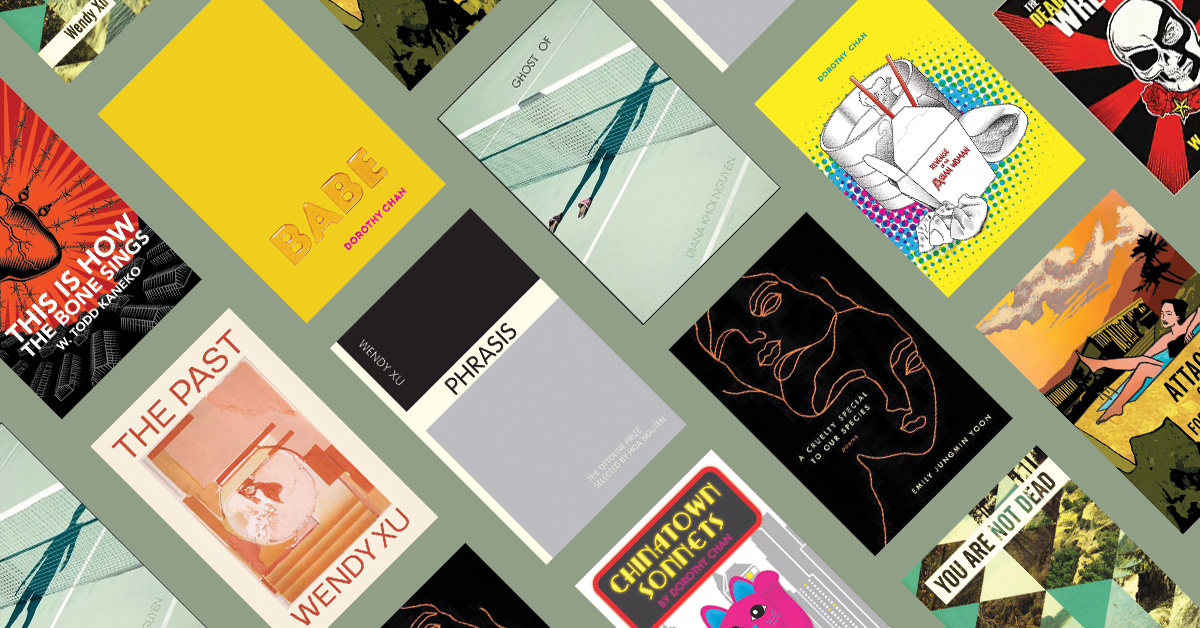5 Awe-Inspiring AAPI Poets to Read Throughout May and Beyond
May is Asian American and Pacific Islander (AAPI) Heritage Month, a time to recognize and elevate AAPI stories and accomplishments. Though Asian Americans and Pacific Islanders represent 7% of the U.S. population—with 22.4 million AAPI people calling the nation home—their experiences and narratives are often overshadowed. These histories are diverse, spanning 50 ethnic groups and 100 different languages. However, they all speak to themes like family, culture, lineage, and community. Add these five poets to your TBR list, and let them inspire you to seek out more AAPI-identifying writers.
Dorothy Chan
View this post on Instagram
Hobart editor and University of Wisconsin-Eau Claire professor Dorothy Chan’s Chinese identity greatly informs her poetry. This can be seen in the titles of her collections, such as Revenge of the Asian Woman, in which poems serve as odes to cultural cuisine, explorations of how food serves as a bridge between multigenerational family relationships, and a deep dive into interracial sex and romance. Chan, who recently founded the journal Honey Literary to publish works by women of color, takes a sharp look at the intersection between gender and ethnicity in her writing, illustrating how the male gaze impacts Asian women from a unique and specific lens.
Collections by Dorothy Chan: Babe, Revenge of the Asian Woman, Attack of the Fifty-Foot Centerfold, Chinatown Sonnets
W. Todd Kaneko
View this post on Instagram
Japanese American poet W. Todd Kaneko is a Kundiman fellow and an associate professor at Grand State University. His most recent collection, This Is How the Bone Sings, delves into the darker history of being Japanese in America, as it’s set in the Minidoka concentration camp. These harrowing and visceral poems use cultural myth and folktales as an access point for their emotional subject matter, speaking across family trees to make an important point about intergenerational trauma. Much of Kaneko’s other work consists of elegy, showcasing how the process of grief is deeply tied to culture.
Collections by W. Todd Kaneko: This Is How the Bone Sings, The Dead Wrestler Elegies
Diana Khoi Nguyen
View this post on Instagram
Diana Khoi Nguyen is a Vietnamese American poet, a Kundiman fellow, and a Bread Loaf Writers’ Conference fellow. Her debut collection, Ghost Of, was released in 2018 and was nominated for the National Book Award. Terrence Hayes characterized the book as a collection of “exile and elegy” in a blurb, as it weaves together her parents’ experience living through the Vietnam War and her brother’s suicide. The distinct parallelism of these two life-altering events shows Nguyen reckoning with the non-linear process of healing. Ghost Of’s highly visual, multimodal nature—with poems often in the concrete poetry form and incorporating family photographs—creates a tangible and physical recording of family, lineage, culture, and grief. In this way, Ghost Of operates not only as a collection but also as a scrapbook and archive.
Collection by Diana Khoi Nguyen: Ghost Of
Wendy Xu
View this post on Instagram
Wendy Xu is a Chinese American poet, a professor at the New School, and the poetry editor for Hyperallergic. As the title of her most recent collection, The Past, suggests, the book looks back on family history while also reconciling how these events and perspectives shape the present. Xu immigrated to the United States with her family at the age of two, just days ahead of the violent, intense, and history-making Tiananmen Square protests. In The Past, Xu considers how her Chinese heritage often collides and conflicts with Westernized expectations and desires. Above all, Xu is known for working with forms in a fascinating manner: Her fragmented stanzas hint at fragmented, dualistic identity, and she both embraces and pushes back against traditional Chinese forms, finding modes of reinvention.
Collections by Wendy Xu: The Past, Phrasis, You Are Not Dead
Emily Jungmin Yoon
View this post on Instagram
Emily Jungmin Yoon’s Korean heritage is a fundamental part of her writing and overall literary involvement. She’s served as an editor for The Margins, the online literary journal published by the Asian American Writers’ Workshop, and is also currently working toward a PhD in Korean literature at the University of Chicago. Poems like “American Dream” and “Kang Duk-kyung” wrestle with both weighty family expectations and ignorant stereotypes. A Cruelty Special to Our Species, Youn’s stand-out first collection, writes about war from a historically silenced viewpoint: women who face wartime sexual violence. Rather than male soldiers, Korean “comfort women,” or women forced into sex work during World War II, are the main characters in this collection, which Amy Tan called “shocking and unforgettable.”
Collection by Emily Jungmin Yoon: A Cruelty Special to Our Species
Happy reading! If you’d like to show your support for these communities with a donation this month, consider giving to Asian American Writers’ Workshop (AAWW) or Kundiman, two organizations that foster and promote AAPI voices in literature.




